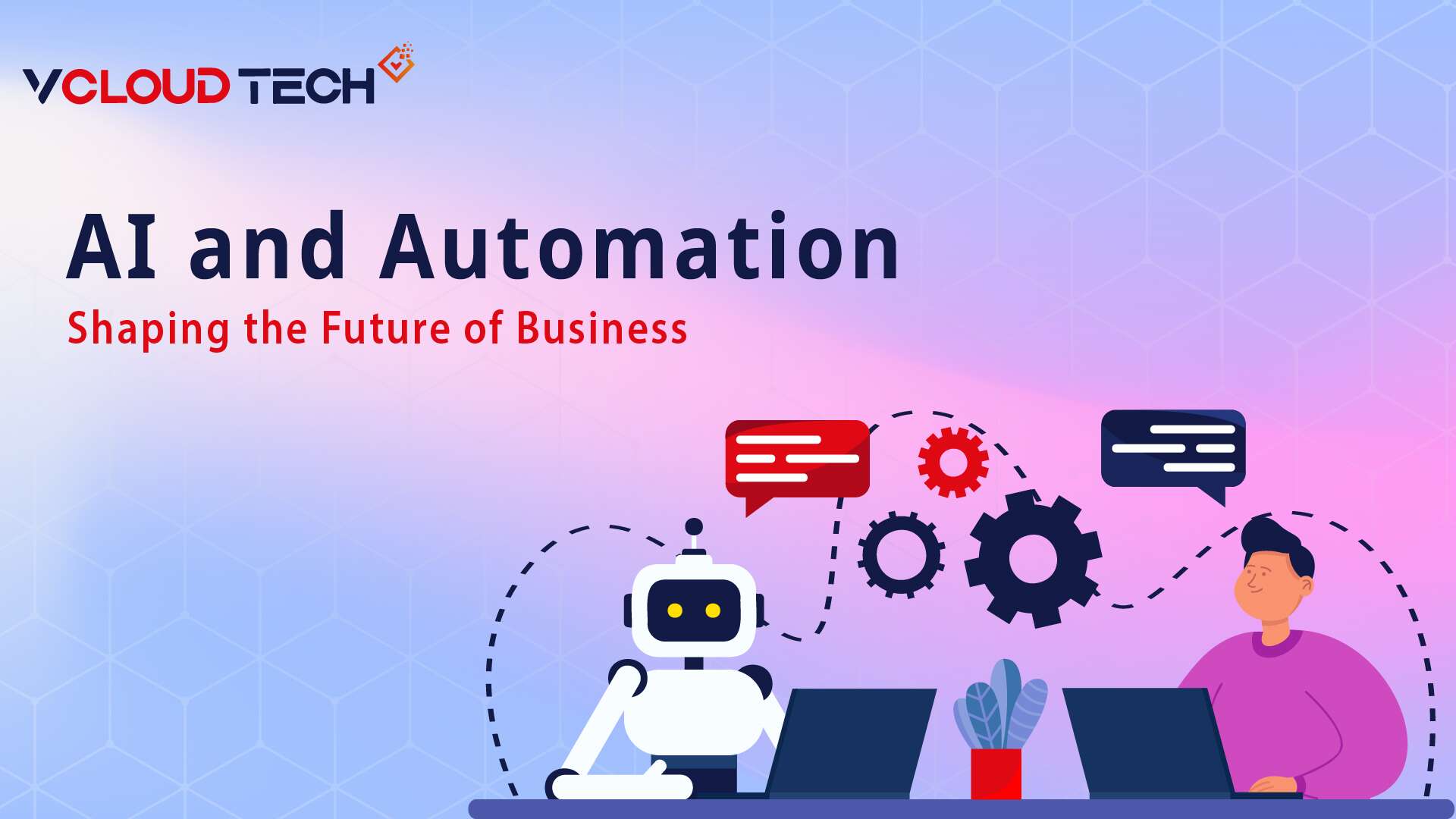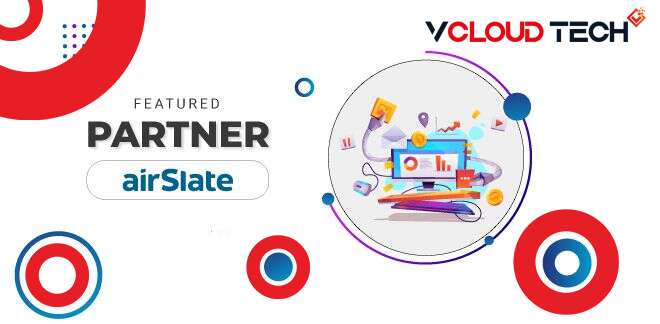The world of business is undergoing a remarkable transformation, thanks to advancements in automation and Artificial Intelligence (AI). These two powerful technologies are revolutionizing the way companies operate, making processes more efficient, accurate, and intelligent. In this article, we will explore the impact of automation and AI on businesses, the future they hold, and the key considerations for successful implementation.
Introduction
In recent years, automation has become increasingly prevalent in various industries, streamlining repetitive tasks and reducing human error. On the other hand, artificial intelligence has gained immense popularity for its ability to mimic human intelligence and perform complex tasks. By combining automation and artificial intelligence technologies, businesses can unlock new opportunities, improve productivity, and drive innovation. Intelligent automation is the combination of AI and automation, where AI technologies enhance the capabilities of automated systems. By incorporating machine learning algorithms, natural language processing, and predictive analytics, businesses can achieve a higher level of automation intelligence. Intelligent automation enables systems to adapt, learn, and make decisions based on real-time data, leading to improved outcomes and increased operational efficiency.
What is Automation?
Automation refers to the process of using technology to automate repetitive tasks and workflows. It involves the use of software, robotics, and other tools to perform activities that were traditionally carried out by humans. From manufacturing and logistics to customer service and data analysis, automation has the potential to transform every aspect of business operations.
What is Artificial Intelligence?
Artificial intelligence, often referred to as AI, involves the development of computer systems that can perform tasks that typically require human intelligence. AI technologies include machine learning, natural language processing, computer vision, and deep learning. These systems can analyze vast amounts of data, make predictions, and learn from patterns to make informed decisions.
The Intersection of Automation and Artificial Intelligence
The intersection of AI and Automation represents a powerful combination that has the potential to revolutionize various industries and aspects of our lives. AI, or artificial intelligence, refers to the development of intelligent machines that can simulate human cognitive processes and perform tasks that typically require human intelligence. Automation, on the other hand, involves the use of technology to perform tasks with minimal human intervention.
When Automation and Artificial Intelligence converge, it enables the creation of intelligent systems that can automate complex processes, make informed decisions, and adapt to changing circumstances. Automation and Artificial Intelligence are closely intertwined, with AI enhancing the capabilities of automation systems. By integrating AI technologies into automated processes, businesses can achieve greater accuracy, adaptability, and efficiency. AI enables automation systems to learn and improve over time, making them more intelligent and responsive to changing circumstances.
The Role of Business Intelligence
Business intelligence (BI) plays a crucial role in harnessing the power of automation and artificial intelligence. BI involves the collection, analysis, and interpretation of data to support business decision-making. With AI and automation, companies can leverage BI tools to extract valuable insights from large datasets and make data-driven decisions that drive growth and competitive advantage. the role of Business Intelligence (BI) extends further in supporting decision-making and strategic planning within organizations. Here are some additional key points about the role of BI:
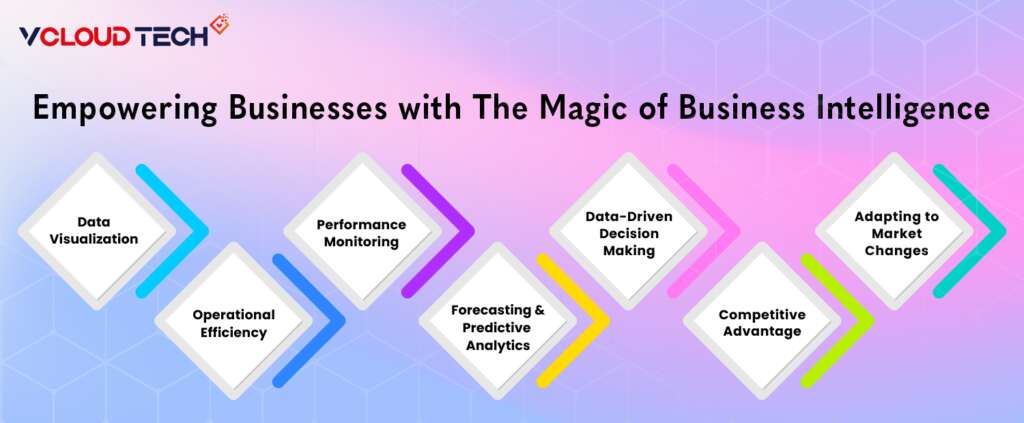
Data Visualization:
Business intelligence provides powerful data visualization capabilities, allowing users to transform complex data into visual representations such as charts, graphs, and interactive dashboards. These visualizations make it easier for stakeholders to comprehend and interpret data, enabling them to identify trends, patterns, and anomalies quickly.
Operational Efficiency:
BI helps improve operational efficiency by streamlining processes and identifying areas for optimization. Through analysis of operational data, businesses can identify bottlenecks, inefficiencies, and areas of waste. This information enables them to make data-driven decisions to streamline operations, reduce costs, and improve overall productivity.
Performance Monitoring:
BI allows organizations to monitor and measure performance against predefined KPIs and goals. Real-time dashboards provide up-to-date information on key metrics, enabling managers and executives to assess performance, identify deviations, and take corrective actions promptly. This real-time monitoring fosters a proactive and agile approach to managing business operations.
Forecasting and Predictive Analytics:
Business intelligence leverages advanced analytics techniques, including forecasting and predictive modeling. These capabilities enable organizations to forecast future trends, anticipate market changes, and make proactive decisions. By analyzing historical data and applying predictive algorithms, businesses can identify potential opportunities and risks, making strategic plans and mitigating potential issues.
Data-Driven Decision Making:
The BI promotes a culture of data-driven decision-making within organizations. It empowers decision-makers at all levels to access relevant, accurate, and timely information to support their decision-making processes. By basing decisions on data and insights rather than gut feelings or assumptions, organizations can make more informed and effective choices that align with their business goals.
Competitive Advantage:
Business intelligence provides organizations with a competitive advantage by enabling them to gain deeper insights into their customers, market trends, and competitors. By analyzing customer behavior, preferences, and feedback, businesses can tailor their products and services to meet customer needs more effectively. This customer-centric approach can drive customer satisfaction, loyalty, and ultimately, business growth.
Adapting to Market Changes:
BI helps organizations adapt to market changes and shifts in customer demands. By monitoring market trends, competitor activities, and customer sentiment, businesses can quickly identify emerging opportunities or threats. This enables them to proactively adjust their strategies, launch new products or services, and stay ahead of the competition.
Leveraging IoT in AI and Automation
The Internet of Things (IoT) is another key component in the realm of automation and artificial intelligence. IoT refers to the network of interconnected devices and sensors that collect and exchange data. By combining IoT with automation and artificial intelligence, businesses can create smart systems that gather real-time data, monitor operations, and automate processes based on intelligent analysis. IoT refers to the network of interconnected devices embedded with sensors, software, and connectivity, enabling them to collect and exchange data. Integrating IoT with AI and automation offers numerous benefits and transformative opportunities. Here’s how businesses can leverage IoT in AI and automation:
Data Collection and Real-time Insights:
IoT devices generate vast amounts of data from sensors and connected devices. This data provides valuable insights into operations, processes, and customer behavior. By integrating AI and automation with IoT, businesses can collect and analyze real-time data, enabling them to make informed decisions quickly. For example, in a manufacturing setting, IoT sensors can collect data on machine performance, and AI algorithms can analyze it to predict potential failures and trigger automated maintenance processes.
Enhanced Automation:
IoT plays a pivotal role in expanding the scope and capabilities of automation. By connecting devices and systems through IoT, businesses can create intelligent automation systems that operate seamlessly and autonomously. For instance, in a smart home setting, IoT devices can be interconnected to automate tasks such as adjusting temperature, turning on lights, and managing security systems based on predefined patterns or user preferences.
Predictive Maintenance:
IoT-enabled devices can monitor and collect real-time data on equipment performance, allowing businesses to adopt predictive maintenance strategies. AI algorithms can analyze this data and detect patterns that indicate potential failures or maintenance requirements. With Tech Data IoT Industrial automation, the system can automatically schedule maintenance tasks, order replacement parts, or alert technicians, minimizing downtime and reducing costs.
Improved Supply Chain Management:
IoT sensors can track and monitor goods throughout the supply chain, providing real-time visibility into inventory levels, location, and conditions. By integrating AI and automation, businesses can optimize inventory management, streamline logistics, and enhance supply chain efficiency. For example, automation and artificial intelligence algorithms can analyze IoT data to predict demand patterns and automate procurement processes accordingly.
Smart Energy Management:
IoT devices and smart meters enable businesses to monitor energy consumption and identify areas for energy efficiency improvements. By integrating AI and automation, businesses can optimize energy usage based on real-time data and adjust settings automatically. For instance, AI algorithms can analyze energy consumption patterns and automate lighting and HVAC systems to minimize energy waste.
Personalized Customer Experiences:
IoT devices gather data on customer behavior, preferences, and interactions. By combining AI and automation, businesses can leverage this data to deliver personalized customer experiences. For instance, in retail, AI algorithms can analyze IoT-collected data to provide tailored product recommendations, personalized offers, and seamless shopping experiences across multiple channels.
Safety and Security:
IoT devices can enhance safety and security by monitoring environments, detecting anomalies, and triggering automated responses. By integrating AI algorithms, businesses can analyze data from Industrial IoT sensors to identify potential risks, such as unauthorized access or unusual behavior. Automation can then be employed to take immediate actions, such as activating alarms, notifying security personnel, or adjusting security settings.
Remote Monitoring and Control:
IoT devices enable remote monitoring and control of various assets and processes. By integrating AI and automation, businesses can remotely manage and optimize operations from anywhere, leading to increased efficiency and cost savings. For example, in agriculture, IoT Molex Asset Tracking Solutions can collect data on soil moisture levels, and AI algorithms can automate irrigation systems based on optimal watering requirements.
Impact of AI on Business
The impact of AI on business is multifaceted. On one hand, AI can increase efficiency by automating tasks and improving accuracy. It can also enhance customer experiences through personalized recommendations and intelligent chatbots. However, AI can also disrupt job markets and raise concerns about privacy, security, and ethics. Businesses need to carefully navigate these challenges. The Impact of AI on businesses is profound and far-reaching, creating opportunities for growth, efficiency, and innovation. Here are some key impacts of AI on business:
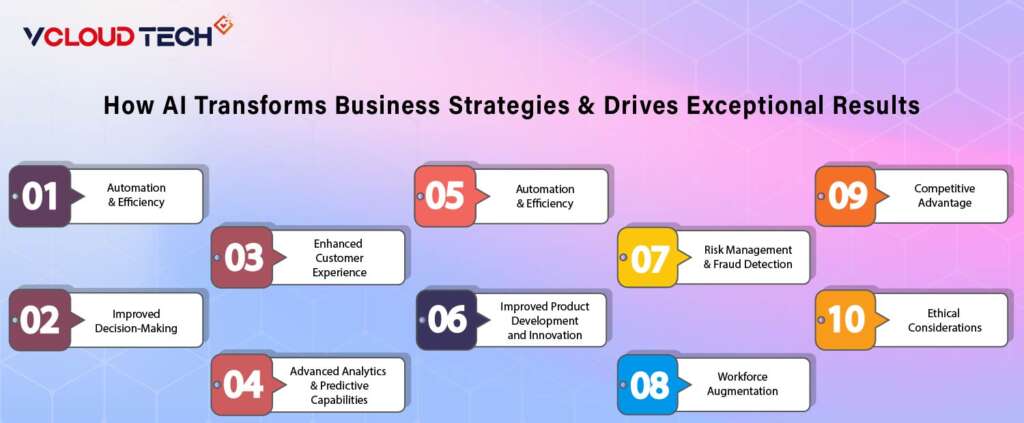
Automation and Efficiency:
AI enables businesses to automate repetitive and mundane tasks, freeing up human resources to focus on more strategic and creative endeavors. AI-powered systems can handle data entry, analysis, and routine customer interactions, leading to increased efficiency, reduced errors, and cost savings. Automation also allows businesses to scale their operations without a proportional increase in human resources.
Improved Decision-Making:
AI empowers businesses to make data-driven decisions by analyzing vast amounts of data quickly and accurately. AI algorithms can identify patterns, trends, and correlations within data sets, providing valuable insights to support decision-making processes. This enables businesses to make informed decisions, optimize operations, and seize opportunities more effectively.
Enhanced Customer Experience:
AI technologies such as natural language processing and machine learning enable businesses to deliver personalized and tailored customer experiences. AI-powered chatbots and virtual assistants can handle customer inquiries, provide real-time support, and offer personalized recommendations. This enhances customer satisfaction, improves engagement, and fosters long-term customer loyalty.
Advanced Analytics and Predictive Capabilities:
AI enables businesses to extract valuable insights from large and complex data sets. With advanced analytics and predictive modeling, businesses can forecast market trends, predict customer behavior, and identify business opportunities. This empowers organizations to proactively respond to changing market dynamics, stay ahead of competitors, and make strategic business decisions.
Streamlined Operations and Supply Chain:
AI optimizes operations and supply chain management by analyzing data in real-time and identifying bottlenecks, inefficiencies, and opportunities for improvement. AI algorithms can automate inventory management, demand forecasting, and logistics, leading to reduced costs, faster order fulfillment, and improved overall efficiency.
Improved Product Development and Innovation:
AI technologies support businesses in developing innovative products and services. AI can analyze market trends, customer preferences, and competitor data to identify gaps, emerging trends, and opportunities for innovation. AI-powered algorithms can also assist in designing and testing new products, accelerating the product development lifecycle and reducing time to market.
Risk Management and Fraud Detection:
AI plays a crucial role in risk management and fraud detection for businesses. AI algorithms can analyze vast amounts of data, detect anomalies, and identify potential risks and fraudulent activities. This helps businesses mitigate risks, prevent fraud, and ensure regulatory compliance.
Workforce Augmentation:
Rather than replacing human workers, AI complements and augments their capabilities. AI systems can assist employees in tasks such as data analysis, research, and decision support, enhancing their productivity and enabling them to focus on higher-value tasks that require human judgment and creativity. This collaboration between humans and AI leads to more efficient and effective outcomes.
Competitive Advantage:
Adopting AI technologies can provide businesses with a competitive edge. Organizations that leverage AI effectively can improve operational efficiency, deliver superior customer experiences, and make faster and more accurate decisions. This positions them ahead of competitors and enables them to adapt to market changes and customer demands more effectively.
Ethical Considerations:
As AI becomes more prevalent in business operations, ethical considerations come into play. Businesses need to ensure that AI systems are transparent, fair, and unbiased. They must address concerns related to privacy, security, and algorithmic bias to maintain trust with customers and stakeholders.
Benefits and Challenges of Automation
Automation offers several advantages to businesses. It eliminates the need for manual labor in repetitive tasks, reducing errors and improving efficiency. By automating processes, companies can save time and resources, allowing employees to focus on more complex and creative work. Additionally, automation enables businesses to scale their operations without a proportional increase in costs.
However, automation also presents challenges. Workforce displacement is a concern, as certain jobs may become obsolete with the introduction of automated systems. It is crucial for businesses to provide training and reskilling opportunities to employees affected by automation. Moreover, ensuring the security and integrity of automated systems is paramount, as any vulnerabilities can have significant consequences.
How AI and Automation Are Transforming Industries?
AI and automation are transforming industries across the board. In manufacturing, robots and automated assembly lines increase production speed and precision. In healthcare, AI-powered diagnostics and robotic surgery assist doctors in providing accurate and efficient care. Retail businesses leverage AI to personalize customer experiences through recommendation systems. Financial institutions employ automation to streamline Financing processes like fraud detection and risk assessment.
Key Considerations for Implementing AI and Automation
Implementing AI and automation requires careful planning and consideration. Here are some key factors to keep in mind:
Identify Suitable Use Cases:
Determine which processes can benefit most from automation and AI integration. Focus on tasks that are repetitive, data-intensive, or require complex analysis.
Data Quality and Accessibility:
Ensure that the data required for AI and automation is of high quality and easily accessible. Data plays a crucial role in training AI models and enabling intelligent decision-making.
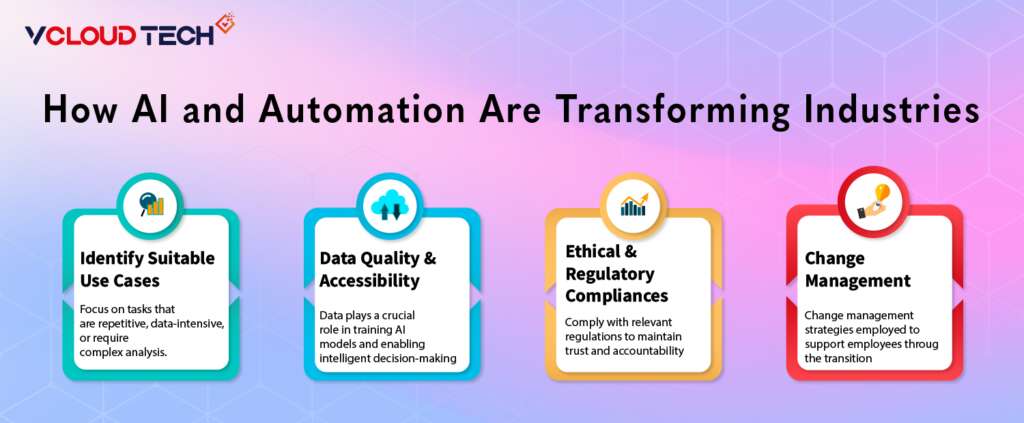
Ethical and Regulatory Compliance:
Consider the ethical implications of using AI and automation, such as privacy, bias, and transparency. Comply with relevant regulations to maintain trust and accountability.
Change Management:
Implementing AI and automation often involves changes in workflows and job roles. Effective change management strategies should be employed to support employees through the transition.
The Future of Automation and Artificial Intelligence
The Future of AI and automation holds immense potential for businesses across industries. As technologies continue to advance, we can expect even greater levels of automation and AI integration. The convergence of AI, automation, and IoT will enable autonomous systems that can optimize operations, predict trends, and provide personalized experiences for customers. As advancements in AI and automation continue to unfold, we can expect to witness significant transformations across industries and society as a whole. Here are some key insights into the future of AI and automation:
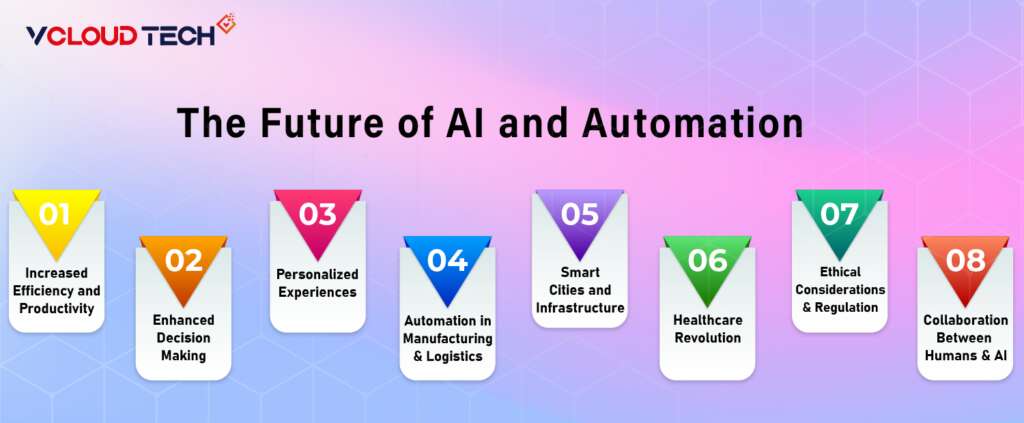
Increased Efficiency and Productivity:
AI and automation will continue to drive efficiency and productivity gains in businesses. Through intelligent automation, routine and repetitive tasks can be automated, freeing up human resources to focus on more complex and creative endeavors. This increased efficiency will lead to cost savings, faster turnaround times, and improved overall productivity.
Enhanced Decision-Making:
AI-powered systems will play a crucial role in decision-making processes. With access to vast amounts of data and advanced analytical capabilities, AI can analyze complex information, identify patterns, and provide valuable insights to support decision-makers. This will enable more informed and data-driven decision-making across industries, leading to better outcomes and competitive advantages.
Personalized Experiences:
AI and automation will enable businesses to deliver highly personalized experiences to their customers. By leveraging data on customer preferences, behaviors, and past interactions, AI algorithms can provide tailored recommendations, personalized marketing messages, and customized user experiences. This level of personalization will enhance customer satisfaction and foster stronger customer relationships.
Automation in Manufacturing and Logistics:
The future will witness a significant expansion of automation in manufacturing and logistics processes. AI-powered robots and autonomous vehicles will take on more tasks traditionally performed by humans, leading to increased efficiency, accuracy, and safety. This automation will revolutionize supply chains, enabling faster order fulfillment, optimized inventory management, and streamlined logistics operations.
Smart Cities and Infrastructure:
AI and automation will play a vital role in the development of smart cities and infrastructure. IoT Cisco IoT Solutions, interconnected systems, and AI algorithms will enable efficient management of resources, traffic optimization, intelligent energy grids, and improved public services. Hitachi Vantara Smart City Spaces solutions result in sustainable urban development, enhanced quality of life, and reduced environmental impact.
Healthcare Revolution:
AI and automation will revolutionize healthcare delivery. AI-powered diagnostic systems can analyze medical data, images, and patient histories to provide accurate diagnoses and treatment recommendations. Robotic surgery systems will enhance precision and enable minimally invasive procedures. Virtual assistants and chatbots will provide personalized healthcare advice and support. These advancements will improve patient outcomes, increase access to healthcare, and alleviate the burden on healthcare professionals.
Ethical Considerations and Regulation:
As AI and automation become more pervasive, ethical considerations and regulations will play a crucial role. Concerns such as job displacement, algorithmic bias, privacy, and security will need to be addressed through responsible and ethical use of these technologies. Regulations and guidelines will be developed to ensure transparency, fairness, and accountability in AI and automation systems.
Collaboration Between Humans and AI:
Rather than replacing humans, AI and automation will augment human capabilities and facilitate collaboration. Humans will work alongside AI systems, leveraging their strengths in data analysis, pattern recognition, and automation while bringing their unique creativity, intuition, and empathy to problem-solving and decision-making. This collaboration will lead to more innovative solutions and new opportunities for growth.
The Ethical Implications of AI and Automation
As AI and automation become more prevalent, ethical considerations come to the forefront. It is essential to address concerns such as privacy, data security, algorithmic bias, and accountability. Transparency in AI decision-making processes is crucial to ensure fairness and prevent unintended consequences. Organizations must develop ethical frameworks and guidelines to govern the use of AI and automation responsibly.
Conclusion
AI and automation are shaping the future of business by revolutionizing processes, improving efficiency, and unlocking new possibilities. The integration of AI technologies enhances automation systems, leading to increased accuracy, adaptability, and intelligence. While there are benefits to be gained, businesses must navigate challenges related to workforce displacement, security, and ethics. By carefully implementing AI and automation, companies can gain a competitive edge and drive innovation in the evolving digital landscape.
FAQs:
What does the future hold for AI in industry?
The future of artificial intelligence in the industry looks promising, as technology continues to advance. According to Statista, investment in artificial intelligence reached $93.5 billion in 2021. The current trend indicates that neural networks will continue to grow larger in the near future, as there is a growing demand for increased functionality.
How will AI and automation impact us?
One of the key ways in which AI and automation will impact the future of work is through the changing nature of labor. As AI systems automate more processes, they will replace human workers, rendering certain professions obsolete while creating new ones.
What effect does automation have on industries?
There is ongoing debate among experts regarding the effects of automation on industries. Some argue that it will create new jobs and boost productivity, while others express concern about job displacement and income inequality. Regardless of the outcome, it is evident that the rise of automation will significantly influence the future of work.
How is AI utilized in automation?
Artificial intelligence, or AI, plays a vital role in intelligent automation. By employing machine learning and complex algorithms to analyze structured and unstructured data, businesses can develop a knowledge base and make predictions based on that data. This serves as the decision engine for intelligent automation.
How can artificial intelligence contribute to the development of future industries?
Artificial intelligence offers several benefits for the development of future industries. It aids in fraud detection, enables better comprehension of unstructured data, transforms the way we work, and enhances the efficiency of business processes. It is therefore crucial to prepare industries for the advent of AI and demonstrate how it can optimize their operations.
Reach out to us and book a Free Consultation with vCloud Tech or chat with one of our representatives. Connect with us on Twitter, Facebook, Instagram, and LinkedIn for more information.



